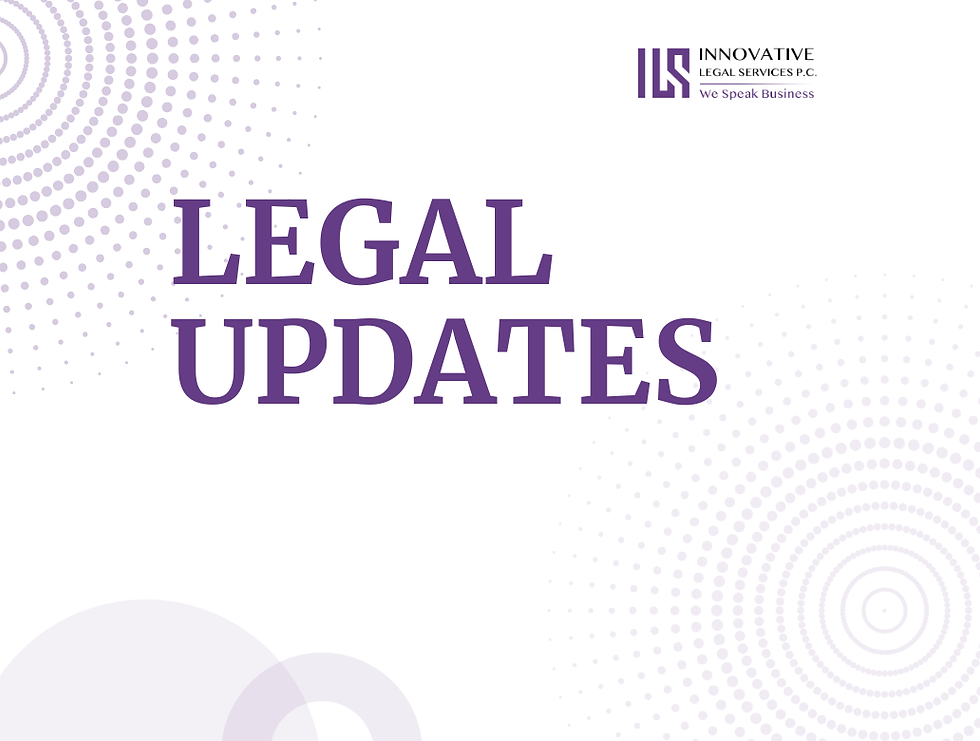Effective Immediately - Cal/OSHA’s Revised COVID-19 Prevention Emergency Temporary Standards (ETS)
- Lynn Lee

- Jun 12, 2023
- 4 min read
- Richard Liu, Esq. (Managing Counsel)
On June 17, 2021, the Occupational Safety & Health Standards Board of California's Division of Occupational Safety and Health ("Cal/OSHA") had approved the latest version of the Emergency Temporary Standards ("ETS"), which governs how California employers should respond to COVID risks at workplaces. The new standards have relaxed requirements such as wearing of face coverings and social distancing, but at the same time are imposing new obligations on employers, including (1) documenting vaccination status, (2) providing respirators upon request, and (3) offering free COVID testing to employees.
The new ETS is now in effect.
Below is a detailed summary of the new ETS. The original texts can be accessed here.

New Face Covering Guidelines: Under the new ETS, fully vaccinated employees do not need to wear face coverings indoors or outdoors, except for certain situations during outbreaks and in settings where the CDPH requires all persons to wear them. Employees who are not fully vaccinated will still be required to wear face coverings while indoors or in vehicles, subject to certain exceptions (e.g., while eating or drinking, while alone in a room, while physical distancing, etc.). When outdoors, face coverings are not required for all employees, except for certain employees during outbreaks.
Further, only medical masks, surgical masks, two-fabric layer masks, or respirators qualify as a “face covering” under the new ETS. This means cloth masks such as a scarf, ski mask, balaclava, bandana, turtleneck, collar, or single layer of fabric will not meet the standard.

No More Physical Distancing: The new ETS has eliminated the physical distancing requirements for both vaccinated and unvaccinated employees. The exception is where an employer determines there is a hazard for certain employees or during major outbreaks.
Employers Must Provide Respirators Upon Request: Employees who are not fully vaccinated may request respirators from their employers, which shall be provided at no cost. Employers do not need to purchase respirators immediately. At present there is no guidance on the timeframe for California employers to respond to employee requesting respirators.
Employers Must Ascertain Vaccination Records: Employers are required to gather and maintain information regarding employee vaccinations. Acceptable methods for documenting status include:
Employees provide proof of vaccination (vaccine card, image of vaccine card or health care document showing vaccination status);
Proof of vaccination shown to the employer, and the employer maintains a record of the employees who presented proof, but not the vaccine record itself; or
Self-attestation by employees. Employees who have not provided documentation or attestation of their fully vaccinated status must be treated as if they are unvaccinated for all purposes in the revised ETS.
Alternatively, the employer may require all employees to wear face coverings instead of having a documentation process.

Employers Must Provide COVID Testing Information:
Employers must offer free COVID-19 testing to unvaccinated employees with COVID-19 symptoms.
Alternatively, employers may inform those employees on how they can obtain free COVID testing. This could be done through the local health department, a health plan, or at a community testing center.
If applicable, employers must reimburse the employee for all costs related to getting the COVID test, including loss of pay and transportation costs.
Remote Employees Not Covered: The new ETS does not cover the following scenarios:
Employees who are working from home.
Employees working from a location chosen by the employee, which is not under the control of the employer. For instance, the new ETS does not cover an employee teleworking from a coffee shop, a friend’s home, or a hotel.
Work locations where there is only one employee who does not have contact with other people.
Employers Must Maintain a Written COVID-19 Prevention Program. The program must include the following content:
Provide training to employees regarding the employer’s COVID policies.
Communicate to employees about the employer's COVID-19 prevention procedures.
Identify, evaluate, and correct COVID-19 hazards.
Implement mechanisms to detect COVID symptoms, such as fever, upon entry of workplace.
Provide face coverings and respirators in the manner and in the circumstances specified in the ETS.
Advise employees they can wear face coverings at work, regardless of their vaccination status, without fear of retaliation by the employer.
Use engineering controls, administrative controls, and personal protective equipment under certain circumstances.
Follow procedures to investigate and respond to COVID-19 cases in the workplace.
Make testing available at no cost to employees who have had a “close contact” (as defined in the ETS) with a person with COVID-19, and in the case of multiple infections or a major outbreak.
Exclude COVID-19 cases and exposed employees from the workplace until they are no longer an infection risk. Exposed employees who are fully vaccinated and have no symptoms do not need to be excluded.
Maintain records of COVID-19 cases, and report serious illnesses to Cal/OSHA and to the local health department when required.
Have questions? Contact our labor and employment team for a virtual coffee chat!

Richard Liu, Esq. is the Managing Counsel of ILS. He serves clients as a management-side defense lawyer specializing in employment law. Richard regularly advises Fortune 500 companies and startups on employment, labor, and commercial matters, especially in the defense of wrongful termination, workplace harassment, employment discrimination, internal investigation, wage-hour claims, and trade secret misappropriation.
Email: richard.liu@consultils.com | Phone: 626-344-8949
*Disclaimer: This article does not constitute legal opinion and does not create any attorney-client relationship.


Comments